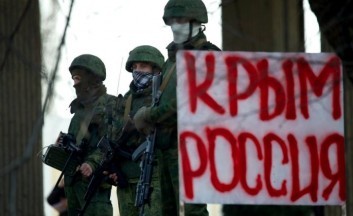Lukashenko recognised Crimea ‘de facto’ part of Russia
 The situation has not changed
The situation has not changed

By supporting Russia’s annexation of Crimea, Lukashenko attempts to preserve good relations with the Ukrainian authorities and delays recognising the legality of Russian actions and offers himself as a mediator in talks between Russia and Ukraine. Meanwhile, the Belarusian authorities are taking some steps, albeit inconsistent, to consolidate Belarusian society.
On March 23rd, Alexander Lukashenko assured Russia of his support and recognised Crimea ‘de facto’ part of Russia with the reservation that no one asked Belarus to recognise it ‘de jure’ and that the situation would not change regardless of the recognition or non-recognition.
Before March 23rd, the day of local elections, official Minsk limited itself to ambiguous statements regarding the referendum in Crimea, on which Russia based its annexation decision.
When speaking on March 23rd, Lukashenko said he neither approved the Russia’s actions vis-a-vis Crimea, nor endorsed the ‘unconstitutional’ change of power in Ukraine. He laid the blame for the situation on the transitional authorities in Kiev, which ‘were set up’ and gave Russia a reason to ‘chop off’ Crimea. He also accused ‘the West’ of being unable to fulfil its obligations under the Budapest Treaty or its threats to restrain world order violators.
In the given situation, when Crimea is already part of Russia, Ukraine has failed to defend its integrity, and the West has not really ‘punished’ Russia (he pointed out that punishment of Russia was ten times weaker than that of Belarus, as it fears Russia), Lukashenko sees no option but to support Russia. Meanwhile, Lukashenko believes that the accession of Crimea is a very dangerous precedent, which could contribute to the proliferation of nuclear weapons around the world.
Supporting Russia in such a peculiar way, Lukashenko also expressed his views about Russia’s agenda vis-a-vis Ukraine. He said he was against Ukraine as a federation, because it would destabilise Belarus’ neighbour for a long time and would eventually result in its disintegration. Lukashenko said he was for the presidential elections in Ukraine and was ready to cooperate with any Kiev government. Otherwise, Lukashenko supported Russian requirements: Ukraine’s non-aligned status, elections to the Vekhovna Rada in the near future, Ukraine’s membership in the CIS, and the political forces disarmament.
With his speech, Lukashenko laid out the guidelines for Belarusian propaganda, which had been floundering since early March, unable to oppose to aggressive Russian propaganda in Russian and Belarusian media space. Events in Ukraine, their coverage by Russian media, and the influx of Russian commentators in Belarusian media resources have split Belarusian society and radicalised positions of both Lukshenko supporters and opponents.
Nevertheless, the Belarusian leadership is aware of the threats that such dependence in the information space creates. The Belarusian authorities, using state-run media and other channels are trying to balance out public opinion in the country. For example, the state television has started showing films about anti-Russian uprising heroes of 1863-1864.
Official Minsk will delay the official recognition of the Crimea annexation until Russia prompts Belarus to make a clear-cut choice. The Belarusian government will increase efforts to reduce tension and division in Belarusian society in order to minimise the possibility of political destabilisation following the Ukrainian scenario.
Subscribe to our newsletter




Situation in Belarus
Constitutional referendum: main consequences


 Video
Video
How to count the political prisoners: are the new criteria needed?


 Video
Video
Paternalism In Decline, Belarusian Euroscepticism, And The Influence Of Russia


 Video
Video












